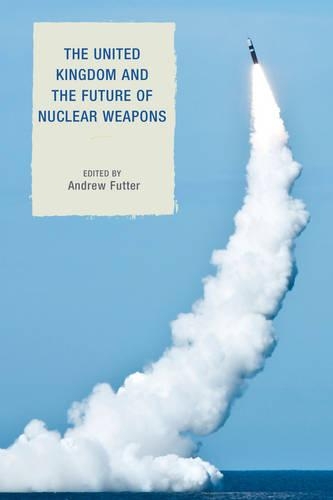
The United Kingdom and the Future of Nuclear Weapons
(Hardback)
Publishing Details
The United Kingdom and the Future of Nuclear Weapons
By (Author) Andrew Futter
Foreword by Sir Lawrence Freedman
Bloomsbury Publishing PLC
Rowman & Littlefield Publishers
16th June 2016
United States
Classifications
Tertiary Education
Non Fiction
Nuclear weapons
327.17470941
Physical Properties
Hardback
244
Width 157mm, Height 237mm, Spine 24mm
549g
Description
Since 1969, the United Kingdom always has always had one submarine armed with nuclear-tipped ballistic missiles underwater, undetected, in constant communication, ready at a set notice to fire at targets anywhere in the world. This is part of its Trident Programme, which includes the development, procurement, and operation of the current generation of British nuclear weapons, as well as the means to deliver them. Operated by the Royal Navy and based at Clyde Naval Base on Scotlands west coast, it is the most expensive and most powerful capability of the British military forces. In 2016, the United Kingdom had to decide on whether to go ahead and build the next generation of nuclear submarines that will allow the UK to remain in the nuclear business well into the second half of this century. The book presents the political, cultural, technical, and strategic aspects of Trident to provide a thoughtful overview of the UKs complex relationship with nuclear weapons. The authors, both scholars and practitioners, bring together diverse perspectives on the issue, discussing the importance of UK nuclear history as well as the political, legal, and diplomatic aspects of UK nuclear weaponsinternationally and domestically. Also addressed are the new technical, military, and strategic challenges to the UK nuclear thinking and strategy.
Reviews
The public debate about the future of British nuclear weapons has traditionally been rather superficial and based on largely unexamined prejudices on both sides of the argument. This timely and balanced study from a wide range of experts, with differing views, calls for an open-minded and informed discussion of the subject. It is an excellent contribution to one of the most fundamental questions facing Britain today. -- John Baylis, emeritus professor at Swansea University, UK
This book, with its contributions from a wide range of knowledgeable individuals, is an invaluable introduction to the complexity surrounding future UK decisions on its nuclear weaponry. Unfortunately many observers may be inclined to simplify the wide ranging political, military, domestic, global, regional, historical, technical, economic, alliance, strategic and normative issues inherent in debating the current and future UK Trident force by focusing their attention on very few of these perspectives. Yet these are decisions that deserve an in-depth and far reaching examination, given that decision-makers are being asked to make decisions which will influence the future of the UK for decades to come. The analyses in this text offer decision-makers and commentators key tools to grapple with the multiple issues relevant to making these future decisions, and should therefore be required reading for those directly involved in making and criticizing them. -- John Simpson, OBE, professor of International Relations at the University of Southampton
Author Bio
Editor: Andrew Futter is a senior lecturer at the University of Leicester, UK Contributors: Peter Burt, director of the UK Nuclear Information Service Catherine Eschle, senior lecturer, University of Strathclyde Toby Fenwick, research associate at the Centre Forum and former RAF officer Jonathan Hogg, senior lecturer, University of Liverpool David Jarvis, associate fellow at the Royal United Services Institute, founder of the UK Project on Nuclear Issues, and former UK Liaison Officer at US STRATCOM Lukasz Kulesa, research director of the European Leadership Network and former head of the Non-proliferation and Arms Control Project at the Polish Institute of International Affairs Nick Ritchie, senior lecturer, University of York Daniel Salisbury, research associate at the Centre for Science and Security Studies, Kings College London Shatabhisha Shetty, deputy director of the and co-founder of the European Leadership Network Kristan Stoddart, senior lecturer at Aberystwyth University William Walker, emeritus professor at the University of St Andrews Heather Williams, MacArthur Postdoctoral Fellow at Kings College London and former Nuclear Policy analyst at Chatham House Henrietta Wilson, independent analyst and associate at the UK Nuclear Information Service
